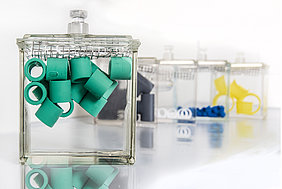The evaluation criteria for plastics and other organic materials in contact with drinking water (KTW-BWGL) has been legally binding for plastics, organic coatings and lubricants since 21 March 2021. In March 2022, elastomers and thermoplastic elastomers were included in the KTW-BWGL with a transitional period that was extended until 1 July 2026. The TZW test centre is accredited for the KTW-BWGL and the underlying test methods and is already well prepared for testing in accordance with the future EU regulations.
Drinking water needs to be protected
According to the German Drinking Water Ordinance (TrinkwV), materials that are used for the construction or maintenance of systems for the production, treatment or distribution of drinking water and that come into contact with drinking water shall not reduce the protection of human health, impair the odour or taste of the water, enhance microbiological growth or release substances into the drinking water in greater quantities than is unavoidable if the generally recognised rules of technology are applied.
Based on section 15 of the German Drinking Water Ordinance (TrinkwV), the German Environment Agency (UBA) has specified the requirements and testing of materials which come into contact with drinking water in evaluation criteria which are. published on the UBA website. The KTW-BWGL and the Silicone Transitional Recommendation apply to organic materials.
Evaluation criteria for plastics and other organic materials (KTW-BWGL)
The KTW-BWGL consists of a general part, which includes the requirements and tests, and a polymer-specific part with material-specific positive lists, which contain the starting materials that may be used for the production of the respective organic materials. Initially, only plastics, organic coatings and lubricants were within the scope of the KTW-BWGL, being legally binding since 21 March 2021. In March 2022, elastomers and thermoplastic elastomers (TPE) were also included in the KTW-BWGL, with an initial transitional period until 1 March 2025, during which the elastomer guideline and the TPE transitional recommendation remain valid in parallel.
In February 2025, the UBA published the 3rd amendment to the transitional regulation Elastomer Guideline, which extends the transitional period until 1 July 2026. However, this extension only applies to components made of materials whose formulation and scope of testing correspond to the current positive list.
Attestation of conformity (hygiene)
The evaluation criteria do not specify how conformity with the requirements is to be confirmed. Therefore, the UBA published the recommendation ‘Conformity attestation of product hygiene suitability for drinking water’, with procedures for issuing an attestation of conformity (hygiene) and thus for obtaining a (hygiene) certificate at about the same time as the KTW-BWGL. Based on this recommendation, DVGW CERT GmbH has established corresponding programmes for procedure ‘1+’ (ZP 1000) and type testing (ZP 0800), which result in the issue of a hygiene certificate if all requirements are met.
Pipes and Ancillaries require the system ‘1+’
The certification procedures according to the ‘Recommendation for attestation of conformity’ can be applied to both individual components and assembled products. The highest requirements for the testing in accordance with the KTW-BWGL and the certification in accordance with the UBA recommendation are applied to pipes and ancillaries, e.g. fittings or valves, which account for the largest proportion of the surface area in contact with drinking water (≥ 10 % proportion). These products and components are classified in risk group P1 according to the KTW-BWGL and have to be certified according to the so-called ‘system 1+’. ‘System 1+’ consists of:
- Initial inspection of the factory and collection of test specimen
- Type testing according to KTW-BWGL
- Factory production control (internal monitoring)
- Annual monitoring test (external monitoring)
The attestation of conformity is issued by an accredited certifier on the basis of test and inspection reports.
The type test consists of the formulation assessment, the migration test in accordance with DIN EN 12873-1 and DIN EN 1420 and the test for the enhancement of microbial growth in accordance with DIN EN 16421.
For products with a smaller proportion of the drinking water contact surface area (risk group P2 and P3), the attestation of conformity can be obtained using the simplified certification procedure based on the type test. Alternatively, the manufacturer can issue a self-declaration based on the test reports of the type test. With these procedures, there is no initial inspection of the factory and no annual external monitoring.
TZW test centre is accredited for the required tests
We are accredited as a testing laboratory for tests in accordance with the KTW-BWGL and offer you expert guidance. In addition, our inspectors carry out specialised audits on behalf of DVGW CERT GmbH as part of the initial inspection of the production facility and the annual monitoring tests.
Furthermore, we are already prepared for the additional tests with regard to the future EU regulations and are accredited for the underlying test methods (pdf file)
Outlook to the European directive
From 31 December 2026, the national regulation will be replaced throughout Europe by a new EU directive. For products that have a valid national attestation of conformity on 31 December 2026, a transitional period will apply until 31 December 2032. The new EU Directive 2020/2184 will be realized by a total of six implementing decisions, which specify regulations and requirements in order to effectively apply the directive in the member states:
- European positive list_(EU) 2024/367
- Methodologies for testing and accepting starting substances to be included in the EU positive list_(EU) 2024/365
- Inclusion of starting substances the EU positive list_(EU) 2024/369
- Procedures and methods for testing and accepting final materials_(EU) 2024/368
- Conformity assessment procedures_(EU) 2024/370
- Specifications for the marking of products_(EU) 2024/371
As the KTW-BWGL is already oriented towards the new EU directive, the main parts of the tests remain the same. Important additions in the new EU regulations are the GC-MS screening for determination of unexpected substances and the migration test with chlorinated test water in cold water range.
The EU positive list is based on the current national positive lists, however all entries have an expiry date. The period of validity of the entries is specified for the respective substance; the manufacturer has to apply for re-assessment in time.

![[Translate to English:] Prüfstelle-Produktprüfung_Teststand Test centre and product testing](/fileadmin/_processed_/0/9/csm_TZW-Karlsruhe_Pruefung_Geraete-Teststand_377188946c.jpg)
























